How to find a target audience?
Targeted advertising is a necessary part of any online advertising campaign. After all, it is not enough to create a marketing offer – it is important to convey its meaning and the benefits to the target audience.
Today we will talk about the most important mechanism of sales – targeting. We will consider what its parameters are, what functions they perform and how they help to promote products on the market.
We’ll also review in detail the entire set of targeting of the BYYD platform.
What is targeting?
Let’s start with a definition of “targeting”.
Targeting is an advertising mechanism. It allows to select from an audience only that part which is suitable for the given criteria. In the end, ads are shown only to target users.
The segmentation is possible due to the setting of various criteria, which are different from platform to platform.
A basic set of characteristics – gender, age, interests, and geography. Correct setting and variety of these parameters reduces the range of potential clients, which makes advertising more effective.
What’s the point of targeting?
Targeting is an essential part of modern marketing.
Its main tasks include:
- increasing the effectiveness of the advertising campaign;
- optimization of the promotion budget;
- getting maximum results after the advertising campaign.
How to apply targeting
Targeting is a marketing tool, so there are different ways to apply it. For example, it is actively used in social networks, contextual advertising and search engines.
A separate category of implementation is the targeting of programmatic.
Targeting in programmatic
Each channel uses its own unique methods of targeting – this allows platforms to be competitive with each other, thereby increasing the potential for promotion for the client.
Speaking of mobile programmatic: there is a large set of criteria within it. Their correct setup helps to focus on a specific audience and deliver an advertising offer to it.
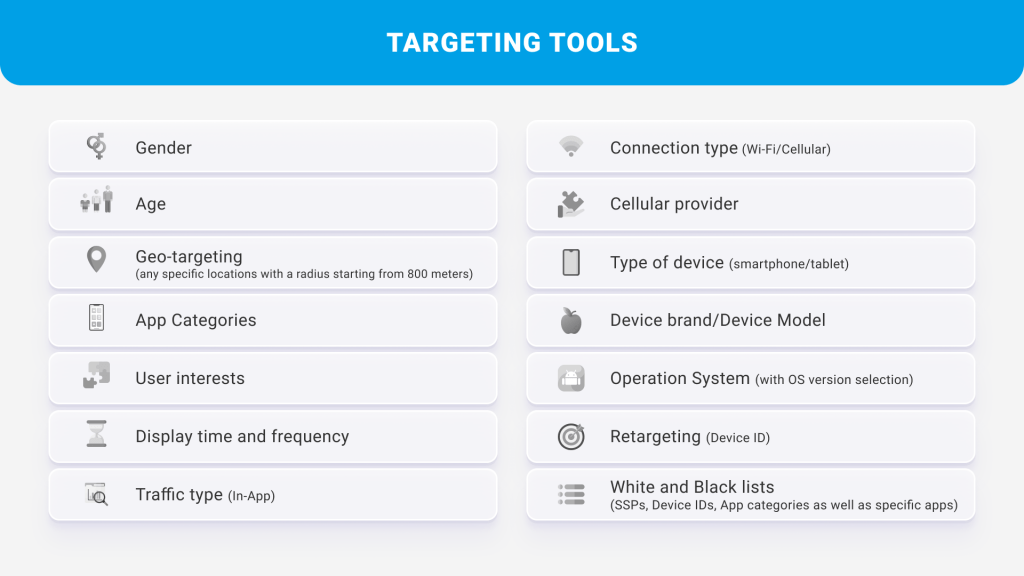
Targeting in BYYD
Today we’ll talk about the different types of targeting that are presented in the BYYD programmatic platform.
- Gender
This parameter uses basic user information that is available to SSP platforms.
This parameter is necessary when the target audience of the ad message belongs to a specific gender. If the ad is potentially interesting to everyone, then the placement applies to both men and women.
A user with no personal data is not included in any of the categories.
- Age
Age also uses basic information about the user.
The capabilities of the BYYD platform allows targeting a range of people from 12 to 65+.
While setting up an advertising campaign, it’s important to remember that the age of the person who uses a product and the age of the person who buys the product are not always the same. For example, it makes sense for a baby food company to target an adult parent, not a five-year-old child.
- Geo-targeting
Geo-targeting is an algorithm for adjusting the advertising, which allows to find a person by his location. The criteria can specify the country, region, city and district.
The BYYD platform also offers super geo-targeting, which allows finding a user with an accuracy of up to 800 m.
This fine-tuning is possible because the user’s location is tracked by GPS. Note that actual tracking is not prevented by an activated VPN on the user’s device.
Here is an example of our case – an advertising campaign for the PARK CINEMA.
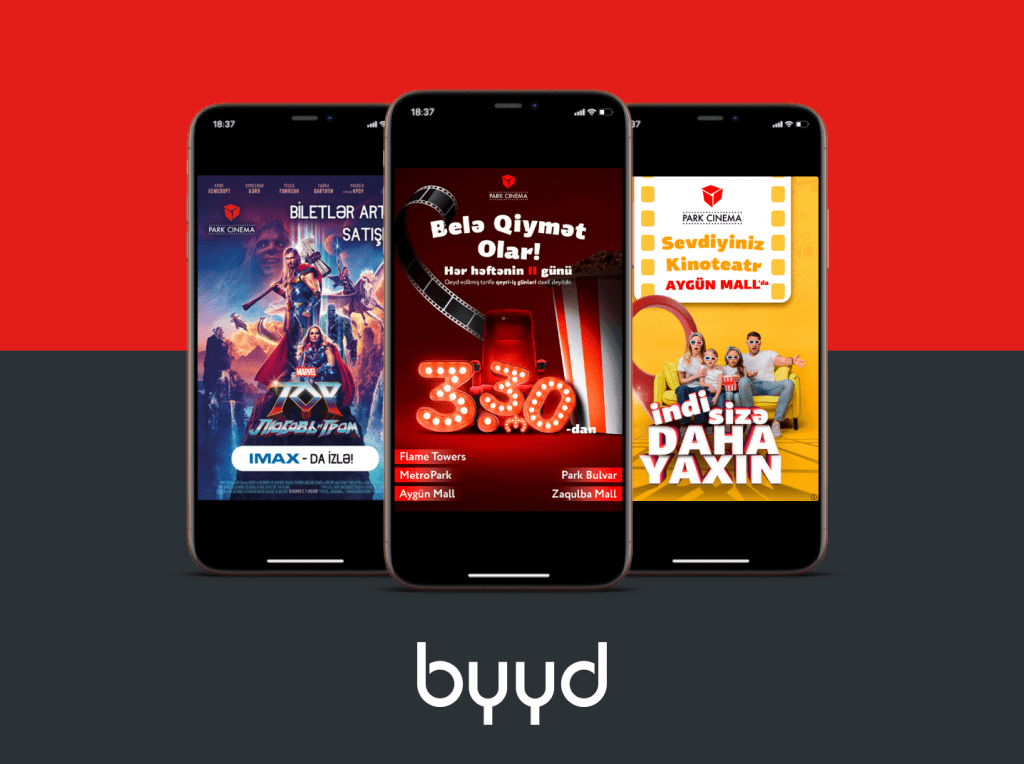
Our main task was to announce the film “Thor” and promotion of “Super Day”. One of the tools was super geo targeting, that we adjust on users within a 3 km range.
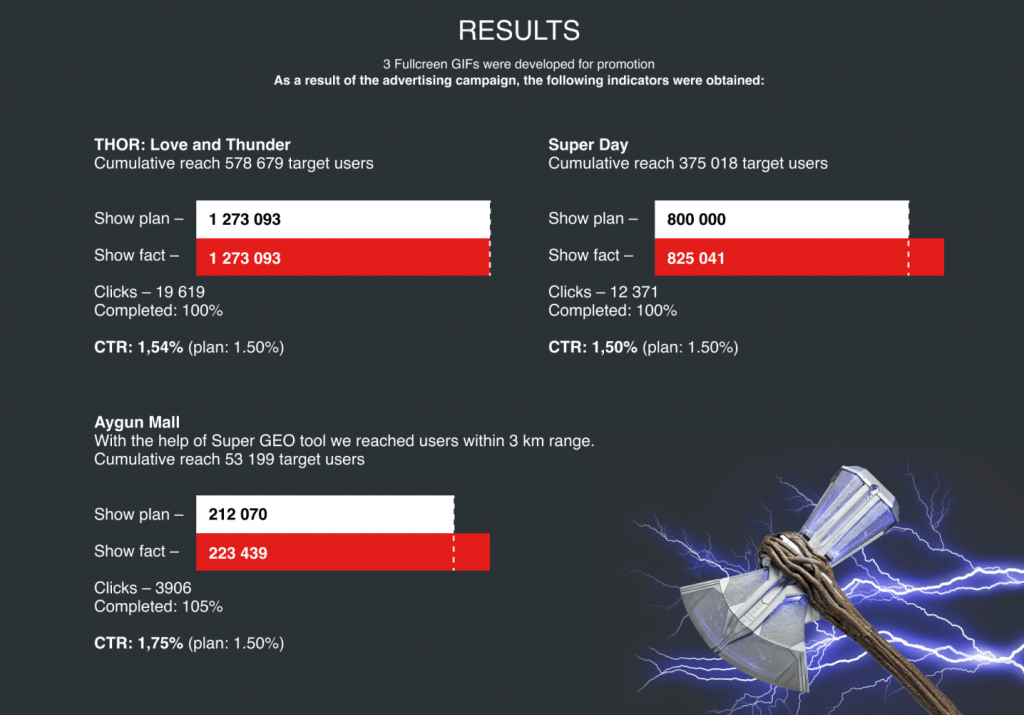
Read more about this case on our website.
- App categories
When an app is uploaded to a digital marketplace, it is assigned a specific category. This targeting focuses on the fact that the user of an app of a specific topic may be attracted to similar advertising content.
For example, you are a seller of fermented dairy products. Think about what kind of people might be interested in your offer? We can assume that those who use calorie trackers, monitor their diet, and lead healthy lifestyles.
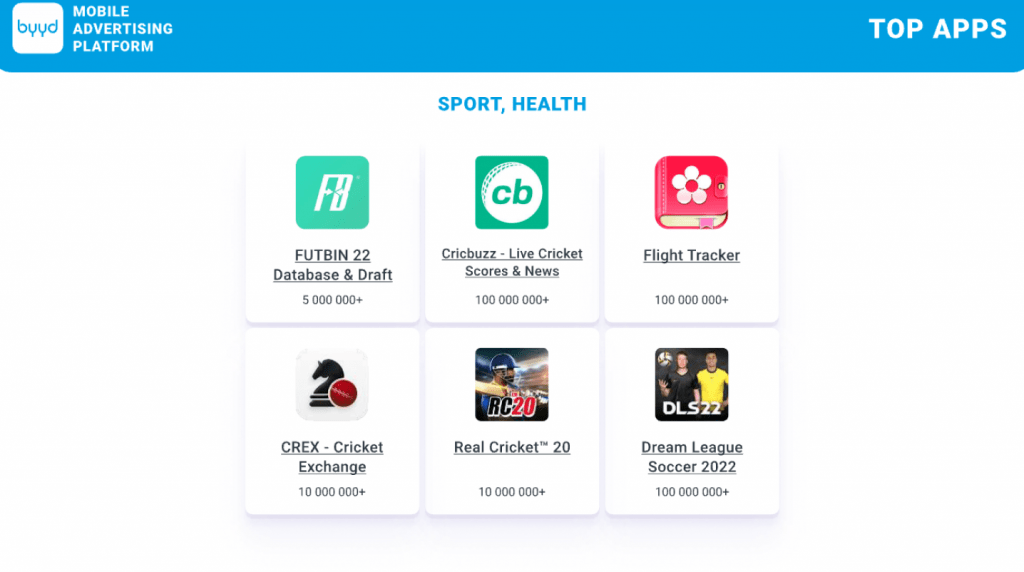
At BYYD, the app categories are selected by qualified mobile specialists. Note that advertising platforms in mobile programming are not only apps with games, but also other popular formats.
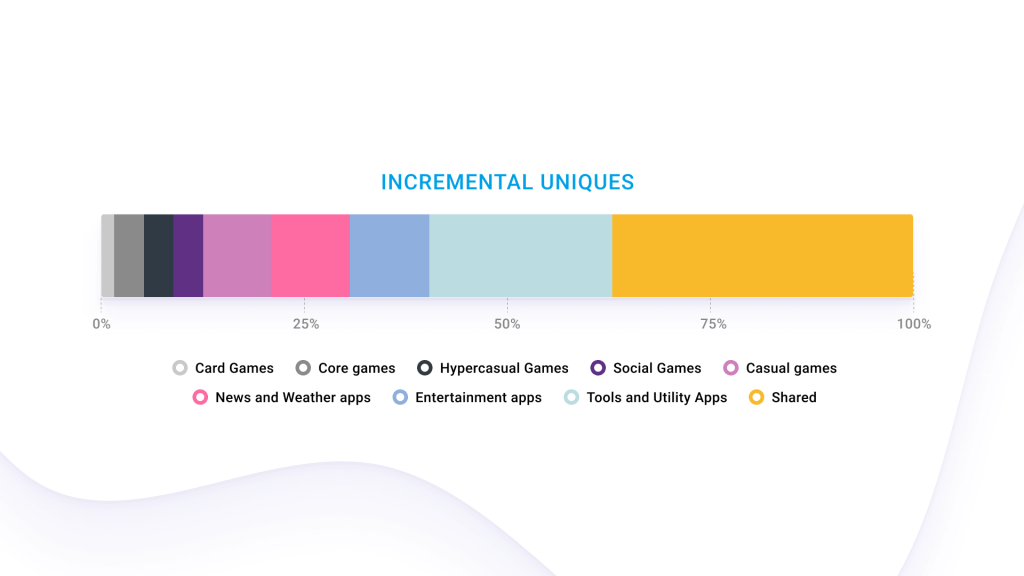
- User Interests
User interests – something the audience is interested in. Special programs analyze user behavior on the Internet by key queries and downloads.
Search engines have information about all key queries. DMPs used by DSPs analyze this data. They then correlate these values with other user ID data and identify users in different interest categories.
For example, if a person is actively interested in property search or visits apps/sites on this topic, the system gives them a corresponding interest.
- Mobile provider
The BYYD platform allows the advertising message to focus on users of a particular mobile service provider.
This feature can be useful for competing mobile service providers or those whose advertising offers depend on this setting.
- Type of device
Device – the technology by which content is consumed. The BYYD programmatic platform provides a classification of mobile devices into smartphones and tablets.
This parameter allows targeting a large volume of the audience, because according to Data Reportal, the majority of people have a mobile device with Internet access.
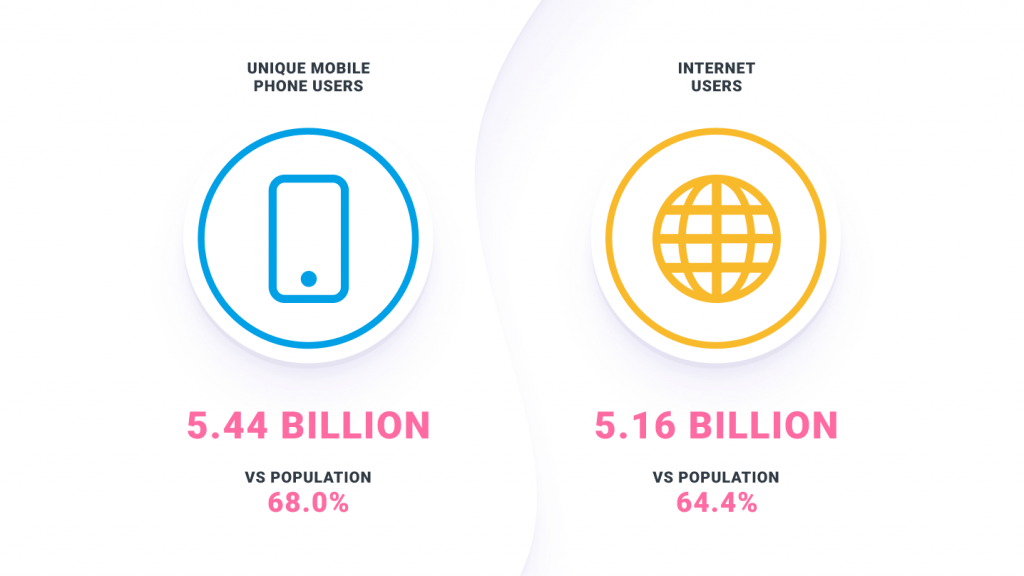
- Device manufacturer/model
The manufacturer of the device is the company that created the device.
Such targeting is necessary for:
– Segmentation of the premium audience: expensive equipment can be afforded by those who have the resources to get it.
– Promotion of accessories for mobile devices.
– Optimization of the landing page, which should be user-friendly for users of all devices.
- Operating system (with OS version selection)
The operating system is the software that allows application programs to run. Among phones and tablets there are several: Apple and Android.
BYYD has the ability to select the OS with the latest versions, as adapting the ads to the specifics of the phone has an impact on the performance of the campaigns.
- Device Language
The device language is also associated with the Device ID. During the downloading of the application, the user decides which language to choose when installing and which to use afterwards.
In BYYD we have these data displayed, which makes it possible to target ads to a specific contingent of users.
Device ID is a unique, anonymous identifier consisting of a combination of numbers and letters associated with a single mobile device: a smartphone, tablet or smartwatch.
- Retargeting (Device ID)
There are two types of retargeting in BYYD:
External
– The client provides us its Device ID database of users who meet the necessary criteria. The data is downloaded, for example, from a mobile app tracker (AppsFlyer, AppMetrica, etc.).
– After the advertising campaign, our platform provides Device ID users to the client for implementation in other advertising tools.
Internal
– BYYD collects users’ Device IDs during a mobile advertising campaign. Then this data is used for retargeting within our own platform. For example, a fullscreen banner is displayed during the campaign. Those users who are interested in the advertising offer are then shown a video format.
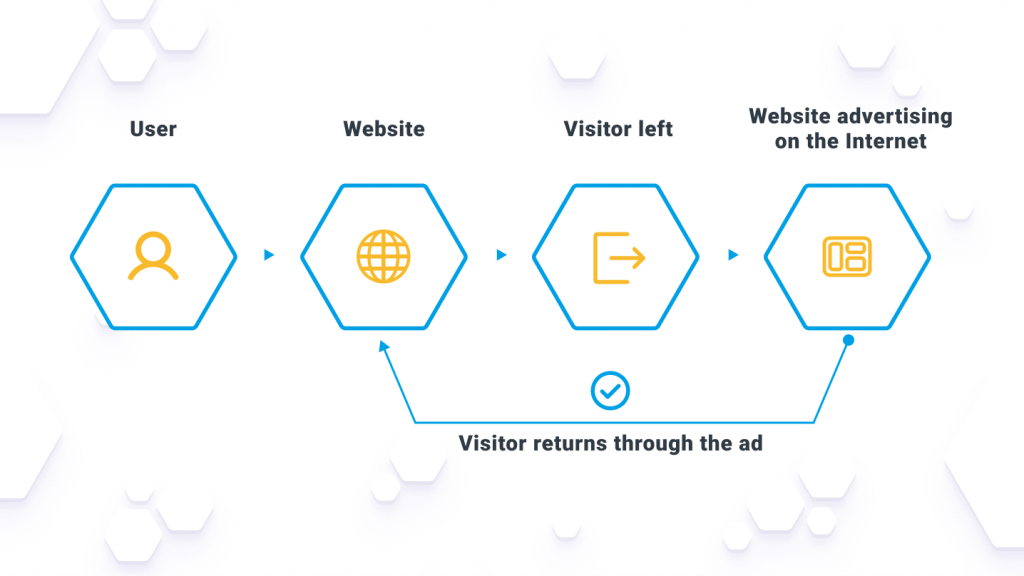
Blacklist and whitelist apps
BYYD has the ability to generate a blacklist and a whitelist of apps.
Blacklist – the one that excludes applications that are inappropriate in terms of subject matter or content.
Whitelist – the one that contains the optimal applications for placement.
BYYD also has the ability to define:
- the frequency of advertising;
- time of advertising.
Creating black/white lists and determining the frequency and timing is not about audience segmentation, but about the characteristics of the advertising campaign setup.
First there is the definition of the target audience, and then the characteristics of the placement.
We use a combination of several types of targeting to achieve the goals of the advertising campaign and to execute the recommended plan.
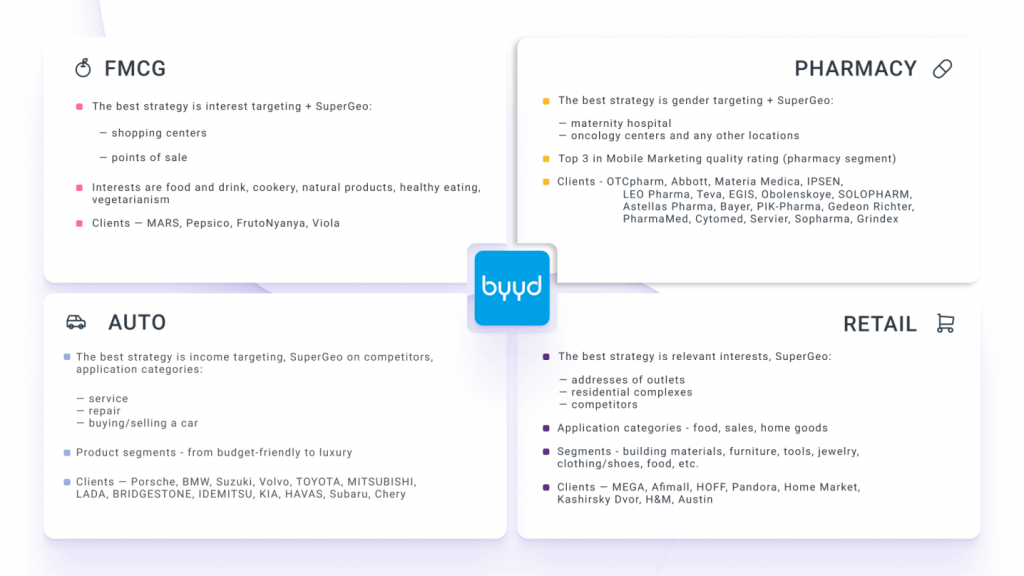
Was it useful? Then share it with your friends and colleagues!
For consultations and cooperation You can contact us in any way:
- by phone +1 (929) 999-5737;
- or through the form on the site.